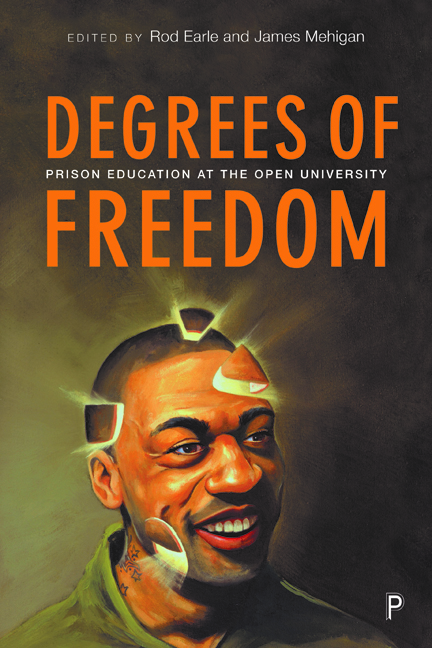Book contents
- Frontmatter
- Dedication
- Contents
- Notes on Contributors
- Acknowledgements
- 1 Openings and Introductions: Education for the Many, Prison for the Few
- 2 From Prisoner to Student
- Vignette 1 Choosing My Journey
- 3 Pioneers and Politics: Open University Journeys in Long Kesh During the Years of Conflict 1972–75
- Vignette 2 Avoiding the Mind-Numbing Vortex of Drivel …
- 4 A University Without Walls
- Vignette 3 Starting a New Chapter
- 5 Open Universities, Close Prisons: Critical Arguments for the Future
- Vignette 4 Out of the Abysmal
- 6 The Light to Fight the Shadows: On Education as Liberation
- 7 From Despair to Hope
- Vignette 5 Making my Commitment
- 8 Straight Up! From HMP to PhD
- 9 From Open University in Prison to Convict Criminology Upon Release: Mind the Gap
- Vignette 6 Message to a Prisoner
- 10 From the School of Hard Knocks to the University of Hard Locks
- 11 Becoming me with The Open University
- Vignette 7 Catching up with Kafka
- 12 From D102 to Paulo Freire: An Irish Journey
- Vignette 8 My Journey, My New Life
- 13 Ex-Prisoners and the Transformative Power of Higher Education
- Vignette 9 Prison Choices: Taking a Degree or Packing Tea?
- 14 What the OU did for me
- Appendix Study with The Open University
- Index
Vignette 5 - Making my Commitment
Published online by Cambridge University Press: 11 March 2021
- Frontmatter
- Dedication
- Contents
- Notes on Contributors
- Acknowledgements
- 1 Openings and Introductions: Education for the Many, Prison for the Few
- 2 From Prisoner to Student
- Vignette 1 Choosing My Journey
- 3 Pioneers and Politics: Open University Journeys in Long Kesh During the Years of Conflict 1972–75
- Vignette 2 Avoiding the Mind-Numbing Vortex of Drivel …
- 4 A University Without Walls
- Vignette 3 Starting a New Chapter
- 5 Open Universities, Close Prisons: Critical Arguments for the Future
- Vignette 4 Out of the Abysmal
- 6 The Light to Fight the Shadows: On Education as Liberation
- 7 From Despair to Hope
- Vignette 5 Making my Commitment
- 8 Straight Up! From HMP to PhD
- 9 From Open University in Prison to Convict Criminology Upon Release: Mind the Gap
- Vignette 6 Message to a Prisoner
- 10 From the School of Hard Knocks to the University of Hard Locks
- 11 Becoming me with The Open University
- Vignette 7 Catching up with Kafka
- 12 From D102 to Paulo Freire: An Irish Journey
- Vignette 8 My Journey, My New Life
- 13 Ex-Prisoners and the Transformative Power of Higher Education
- Vignette 9 Prison Choices: Taking a Degree or Packing Tea?
- 14 What the OU did for me
- Appendix Study with The Open University
- Index
Summary
Excuse me are you a prisoner? This is a hilarious question I am often asked as I walk to and from my prison wing to the education block. I never thought that just by developing my knowledge through studying with The Open University, my outwardly expressive demeanour would suggest to others that I am someone of a professional disposition. I can relate this to an early experience when I was challenged for walking with a limp, implying I held a bad attitude.
I grew up with little schooling due to a number of mental and learning difficulties and had little regard for studying, but often in high school I would hang out with university students in Croydon library to avoid getting into trouble with the law. In 2009, after being sentenced to an indeterminate sentence for public protection, I began to reshape my life and self-worth through studying. Today I am considering postgraduate studies and use my diagnosis of dyslexia, dyscalculia, and ADHD as a source of strength to carry on through my current Open University undergraduate studies.
I was sat in my cell in HMP Pentonville New Year's Eve watching the Thames fireworks display both live outside my cell window and on the telly, and after welcoming in 2010 I made myself a commitment. I often thought I would one day start my own charity and decided to start by making plans about what I want to achieve, what I would need to help achieve these goals and how I could put myself in a position to realise my potential of turning my life around permanently.
Since my teens I had become an alcoholic and developed drug dependencies. These disorders contributed towards my former habits of not holding onto, or rather not appreciating, the greater things in life. So, the idea of developing any permanent stability in my life was very daunting. The Open University has helped me find a little bit of independent structure while being in a prison and having to spend my time around the regime's clock.
I started an Access module after completing my level 2 literacy and maths. Maths was long. I had to work up from entry level 1, which is Key Stage 3, up to Key Stage 5, which is equivalent to GCSEs.
- Type
- Chapter
- Information
- Degrees of FreedomPrison Education at The Open University, pp. 123 - 124Publisher: Bristol University PressPrint publication year: 2019



